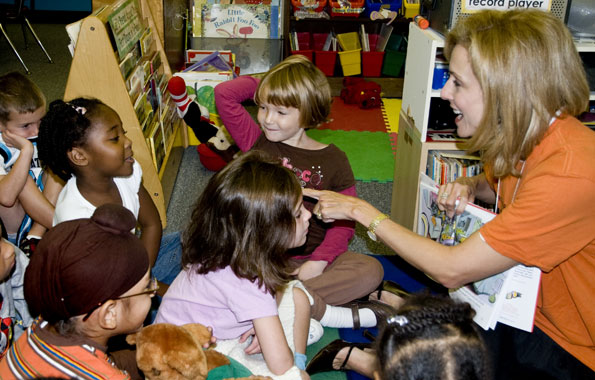KATHERINE BRADLEY, CITYBRIDGE FOUNDATION
Three years ago, I invited my husband, David Bradley, and our son, Carter, to tour a brand new charter school in a church basement on Minnesota Avenue in Southeast Washington’s Ward 7. We were visiting KIPPLEAP, the first early childhood program launched in the District by the KIPP public charter school network. Most of the school’s students came from low-income households. Their demographic peers across the nation generally struggle in failing schools, but these students were thriving in a program indistinguishable in quality from the sought-after Upper Northwest preschool my children had attended.
The more we watched, the more we realized that these four-year-olds were more advanced than my boys had been at the same age. David turned to me and – with uncharacteristic emotion – said: “Once anyone has seen this, how can they tolerate failing schools around the corner? Do,people know this is possible?
”
Increasingly, the answer is “yes.” We do know what’s possible.
Low-income kids are succeeding in rigorous (and nurturing) schools all over the country. We are beginning to understand that poverty need not be destiny. Every single one of the four-year olds we saw in the church basement – 100 percent of the class – is now at or above grade-level in reading.
Once you’ve seen this sort of standardsetting school yourself – as Education Secretary Arne Duncan and President Obama have – you urgently want to spread the word: The country’s urban education crisis is a solvable problem.
Our family foundation, CityBridge, has focused on education reform in the District since the 2005 launch of our Early Years Education Initiative, a series of investments in schools and teachers for young children in Washington. We were lucky that our partners’ work complemented City Council Chairman Vincent Gray’s legislative goal of quality pre-kindergarten for all District children. A powerful model for change resulted: Political leadership, philanthropy, and nonprofit advocates all aligned toward the same set of early childhood goals, allowing significant social change to happen quickly and (relatively) easily.
Getting early childhood right is the essential first step for school reform, but it’s no magic bullet. Each part of the educational continuum has to be good for low-income kids to thrive. As we’ve broadened our focus, we have found that the K-12 space is also filled with compelling ideas, levers for real change, such as new ways to support the best teaching talent or interventions that help children thrive in high-poverty schools. Even with highest-caliber talent – such as Chancellor Michelle Rhee has recruited – it’s much harder to teach when children come to school burdened by the stresses of poverty. So we are helping a successful New York-based organization, which addresses the school-based challenges of poverty, explore whether to come to Washington.
Five years of school reform work has taught us, however, that great schools are not enough. Education reform is a fragile enterprise, and hard-won progress will lastonly if residents from all over the District invest time, resources, and political capital in permanent change. We think education advocates need to build a movement – not just fix the schools. What would that look like for CityBridge?
Our K-12 portfolio of education work, which we are calling Breakthrough Schools, will also include local advocacy, funder collaboration, and broadbased engagement – from grass-roots leaders to local corporations. One idea we have is to expand our existing CityBridge Foundation model of corporate civic engagement. We hope to connect local companies to schools at the vanguard of exciting change, such as the schools in the DC Catalyst project, where new programs in science, the arts, and world cultures will launch next fall.
CityBridge envisions a city of stewards – all invested, across time, in results for our kids. We have so much progress to celebrate: Test scores are up, education talent is flocking to our city, and we have a sound system of schools – charters, traditional public schools, and voucher schools – all creating a healthy market for educational options.
If our city can continue this progress, and build a very large team of education stewards, our kids will succeed. At CityBridge, we are (incessantly) hopeful.

